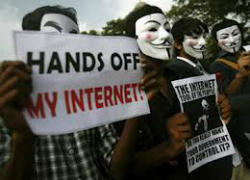
At a United Nations conference last December, eighty-nine countries voted to create a revised telecommunications treaty that would implement a system of international government regulation over the internet. The treaty will increase the authority of the International Telecommunication Union—a United Nations agency—in the regulation of the internet on a global scale. Despite the tremendous response in favor of the treaty, the United States, along with fifty-five other countries, refused to sign. The United States expressed concern over the threats to various freedoms that would result from such a law.
Opponents throughout the U.S. and abroad believe government regulation of the internet will have a decidedly negative effect on the global economy. The primary fear of government internet regulation is the implementation of widespread censorship which would not only affect individuals, but many online companies including internet giants such as Google and YouTube. Internet censorship laws exist in several countries already and they provide a frightening example of the impending threats of the proposed U.N. regulations. Russia, for example, passed an internet blacklist bill last summer requiring ISP’s to censor certain sites in an attempt to protect children from harmful content. However, the bill also censors many Russian journalists and sites containing criticisms of the Russian government. This kind of censorship is a dangerous threat to free speech. Further, the blacklist is already showing signs of a fragmented internet as legal challenges by rights advocates mount and companies as large as YouTube seek freedom from censorship.
Censorship is not the only threat to the global economy. Many see a definite financial danger if government regulation of the internet were to succeed. One fear is that governmental bureaucracy will come to control the engineering and business aspects of the internet. Some regulatory proposals include dramatically altering website distribution, or even charging companies fees for visitor usage. This could be as devastating to companies as outright censorship. FCC Commissioner Robert McDowell believes this could even kill websites. He explained, “MIT and Harvard recently introduced free classes online…. That sort of thing starts to dry up if they have to start paying to put things online.”
While government regulation is a very real threat, there’s still time to stand against it. The United Nations treaty will not go into effect until 2015; that means the U.S. and other opposed nations can still make a case for internet freedom. And, some progress is being made in this direction. Lawmakers have drafted new legislation intended to define the US government’s official policy regarding the internet. The proposal was submitted on February 5, 2013, at a hearing on global efforts for internet regulation and works to further clarify the United States’ position on internet regulation. Above all, the drafted legislation promotes a “global internet free of governmental control.”
It is not hard to understand why now is the time for the U.S. to act on such legislation. The internet is a vital means of communication and commerce throughout the world. Mandatory government involvement in the regulation of the internet will not only hurt the availability of information and access to content for people around the world, but it shakes the very foundations of our global economy. Thus, it is crucial that the United States and other countries stand behind a decentralized model of web governance meant to promote the continued innovation and growth of this important resource. As FCC Commissioner McDowell warned, “dynamic new wonders of the early 21st century are inches away from being smothered by innovation-crushing old rules designed for a different time.”
Stacy Harper is a 2L at Denver University Law School and a Staff Editor for the Denver Journal of International Law and Policy.

